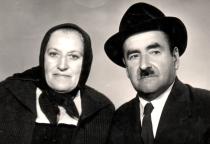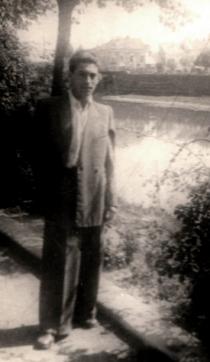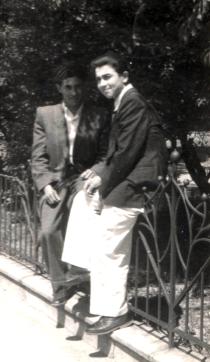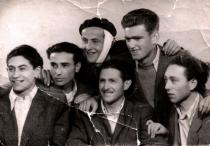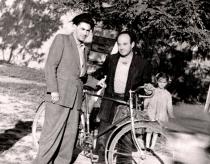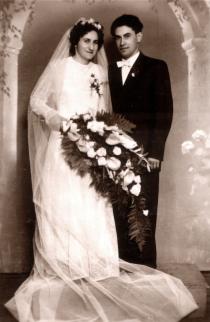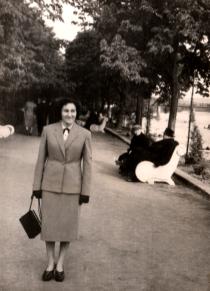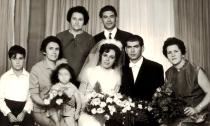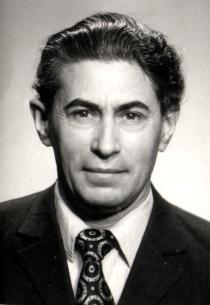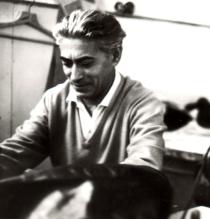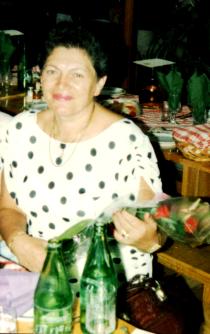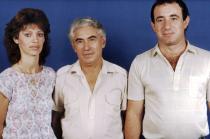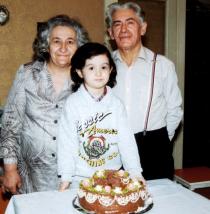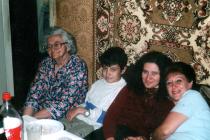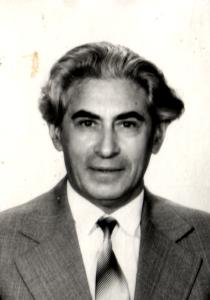This is our wedding photograph. This is me and my wife Lubov Neubauer. This photo was taken in a photo shop in Uzhgorod in 1957.
I was going back from the Auschwitz in the end 1945. I, my mother and sister Hermina settled down in Uzhgorod. We settled down in Uzhgorod. When we came there, we were told to find a dwelling from where Jews had been taken to a concentration camp and move in there. We found a one-bedroom apartment: one big room, a kitchen and a toilet. The three of us moved in there. I became an apprentice of a tailor in a garment store. I had to support my mother and sister, being the only man in the family. It stimulated me to study well and two years later I became a good tailor. Many people ordered their clothes at garment shops since it was hard to buy anything in shops. I could make any clothes, but I was good at making men's suits. The town and region's top men were my clients. Besides my salary I got good tips from my clients, and they also brought me food products that were hard to buy.
Once a young woman came to our garment shop. She asked to fix something in her dress. Later we often met in the street and said ‘hello’ to each other. She arrived in Uzhgorod from Savran town in Odessa region [615 km from Uzhgorod, 270 km from Kiev], on her job assignment after finishing the Pharmaceutical Faculty of Odessa Medical College. When Anna came to Uzhgorod she liked it. Then her middle sister Donia finished the Pediatrics Faculty of Odessa Medical College. She completed her 3-year assignment and her older sister convinced her to settle down in Uzhgorod. Donia worked as a children’s doctor in the polyclinic. Then her younger sister Lubov Kerzhner finished a Pedagogical College and got a job assignment to a Ukrainian village. Finishing her 3-year assignment Lubov arrived in Uzhgorod. She worked as elementary school teacher not far from my shop. We met every morning on our way to work. At first we just said ‘hello’ to one another, then we stopped to talk once and then began to see each other. The sisters were very close and always listen to one another. The older sister spoke well of me. Lubov was 8 years younger than me. She was born in Savran in 1932. Her Jewish name was Liebe. Her father Moisey Kerzhner and her mother Meita Kerzhner were religious. They observed Jewish traditions. Their daughters of course, were no longer religious, but they remained Jewish. They knew Jewish traditions, Jewish culture and spoke Yiddish to one another and to their parents.
We got married in 1957. We had a civil ceremony in a registry office on 18 June and when vacations began at school and teachers went on vacation we had a Jewish wedding. We had to keep it a secret. My wife was a teacher, and authorities watched teachers' ideology very strictly. If her management knew that we had a Jewish wedding she might have been fired with the comment that she 'was not fit to raise the young generation in the spirit of communism'. It happened so at the time. With this entry in her employment records book she wouldn't have found another job as a teacher, or even as a cleaning woman. Therefore, we secretly had a chuppah at home. My relatives and Lubov's sister were with us. Her parents also arrived at the wedding. My mother was very happy that I finally got married and that I had a Jewish wife. They got along well. My mother made challah bread and honey cakes for Sabbath for our family as well. Lubov and I always celebrated Sabbath and Jewish holidays visiting with my mother and stepfather. In 1959 our first baby was born. We named our son Avrum after my father. We had a brit milah ritual for him. Of course, this was also done secretly, but one of my wife's colleagues heard about it and my wife had problems. Her director and the town educational department called her and asked her one question: 'How could you do this?' Fortunately, it ended just with a reprimand. In 1968 our daughter Marina was born. We gave her the Jewish name of Meita after my wife's mother, who had died one year before our daughter was born. My wife and I spoke Yiddish for the most part.

